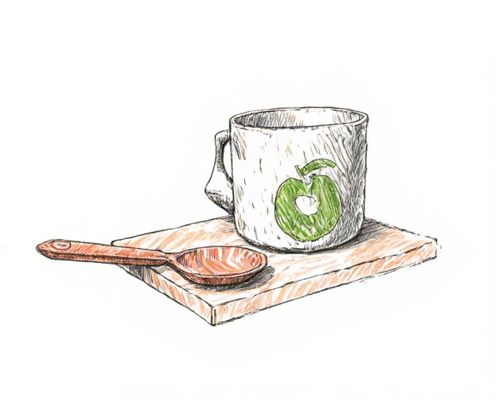
Zero-waste wrap Illustration
Zero-waste wrap offers an eco-friendly alternative to plastic cling films, made from natural materials like beeswax and organic cotton. It provides a reusable, breathable solution for preserving food freshness while reducing single-use waste and environmental impact. This sustainable wrap molds easily around bowls, fruits, and vegetables, making it a practical and stylish choice for conscious kitchens.
Understanding Zero-Waste Wraps: A Sustainable Kitchen Revolution
Zero-waste wraps are reusable food wraps made from organic cotton coated with beeswax, jojoba oil, and tree resin, offering an eco-friendly alternative to plastic cling films. These wraps naturally preserve food freshness, reduce single-use plastic waste, and are biodegradable at the end of their lifespan. Incorporating zero-waste wraps into daily kitchen routines significantly lowers environmental impact while maintaining food hygiene and reducing landfill contributions.
Types of Zero-Waste Wraps for Eco-Friendly Food Storage
Zero-waste wraps for eco-friendly food storage include beeswax wraps, made from cotton infused with natural beeswax, jojoba oil, and tree resin, providing a reusable and breathable alternative to plastic cling wrap. Silicone food wraps offer a flexible, durable, and dishwasher-safe option that creates airtight seals for bowls and snacks without generating waste. Your choice of zero-waste wrap will reduce plastic use and maintain food freshness while contributing to sustainable kitchen practices.
Comparing Beeswax Wraps, Silicone Lids, and Cotton Covers
Beeswax wraps offer natural antibacterial properties and are biodegradable, making them ideal for eco-conscious kitchen use, while silicone lids provide airtight seals and durability with easy cleaning, suitable for various container sizes. Cotton covers, often combined with elastic edges, allow flexibility and breathability but typically require frequent washing and lack the moisture-sealing advantages of beeswax or silicone options. Choosing between these zero-waste wraps depends on desired reusability, sealing strength, and environmental impact priorities.
Environmental Benefits of Switching to Zero-Waste Wraps
Zero-waste wraps significantly reduce plastic pollution by replacing single-use plastic cling films with reusable, biodegradable materials such as beeswax, cotton, and tree resin. These wraps decompose naturally, minimizing landfill waste and lowering carbon emissions associated with plastic production and disposal. Switching to zero-waste wraps supports sustainable living by conserving resources and promoting eco-friendly habits in everyday kitchen practices.
How to Use Sustainable Wraps for Everyday Food Storage
Sustainable zero-waste wraps, typically made from beeswax, organic cotton, and plant-based resins, provide an eco-friendly alternative to plastic wrap for everyday food storage. To use these wraps, warm them slightly with your hands to soften the material, then mold it around fruits, vegetables, sandwiches, or bowls, where it adheres naturally due to the warmth and texture. Cleaning involves rinsing with cold water and mild soap, allowing the wrap to air dry, enabling repeated use for weeks or months while reducing plastic waste in the kitchen.
Caring for and Cleaning Your Reusable Kitchen Wraps
To maintain the longevity of zero-waste kitchen wraps, gently hand wash them in cold water with mild soap and air-dry away from direct sunlight to preserve their natural fibers and beeswax coating. Avoid using hot water or harsh detergents as they can degrade the wrap's effectiveness and cause cracking or warping. Proper care ensures these reusable wraps remain flexible, hygienic, and environmentally friendly alternatives to single-use plastic films.
Zero-Waste Wraps vs. Traditional Plastic Wraps: What Women Should Know
Zero-waste wraps made from beeswax and organic cotton offer a sustainable alternative to traditional plastic wraps, which contribute significantly to landfill waste and ocean pollution. These eco-friendly wraps are reusable, breathable, and biodegradable, reducing single-use plastic dependency while preserving food freshness effectively. Women seeking environmentally conscious kitchenware should consider zero-waste wraps for their durability, non-toxic materials, and positive impact on reducing household plastic waste.
Creative Ways to Incorporate Zero-Waste Wraps in Meal Prep
Zero-waste wraps made from beeswax or soy wax offer an eco-friendly alternative to plastic cling films for meal prep by sealing bowls and covering leftovers while preserving freshness. These wraps can be creatively molded around sandwiches, fruits, or vegetables, providing breathable storage that reduces food waste. Incorporating zero-waste wraps not only supports sustainable kitchen practices but also enhances organization by allowing color-coded or patterned options for different meal components.
Choosing the Best Zero-Waste Wraps for Your Family’s Needs
Selecting the best zero-waste wraps involves prioritizing materials like organic cotton coated with beeswax, which offer durability and natural antibacterial properties. Consider wrap size and flexibility to accommodate various food items while ensuring a secure seal that supports freshness. Evaluating eco-friendly certifications and user reviews helps confirm the wrap's sustainability and practical performance for everyday kitchen use.
Women Leading the Change: Brands Advancing Sustainable Kitchenware
Women-led brands like Bee's Wrap and Etee are pioneering zero-waste wraps, using organic cotton infused with sustainable beeswax, jojoba oil, and tree resin to reduce plastic use in kitchens. These innovative kitchenware solutions prioritize eco-friendly materials, durability, and reusability, significantly decreasing single-use waste. Their leadership in sustainable kitchen products drives a global shift toward environmentally conscious food storage alternatives.
 womendy.com
womendy.com